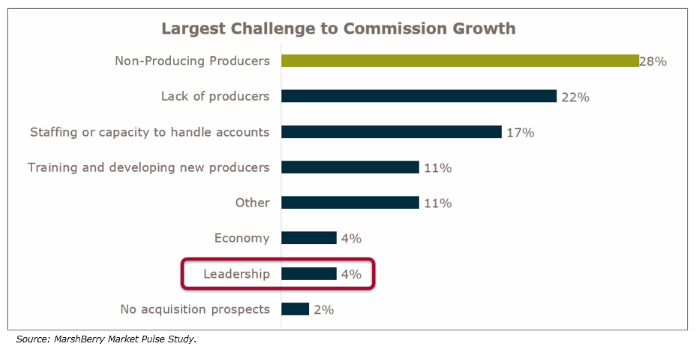In a MarshBerry Market Pulse survey, 28% of leaders (i.e., c-suite executives) identified “non-producing producers” as the largest challenge to commission growth. It was the number one response, followed by lack of producers at 22%. Hidden down the list, second to last, some leaders actually identified “leadership” as their biggest challenge.

Given human nature, it’s hardly surprising that such a small number of the leaders who responded to the survey would pinpoint the problem as being amongst themselves. It’s worth noting that, by definition, those who did identify leadership as their largest challenge don’t feel that non-producing producers are their number one concern. Paradoxically, if their biggest problem is NOT non-producing producers, then they may actually have pretty good leadership. That’s because, in any organization, basically everything is a product of leadership in one form or another, including non-producing producers. Drilling down deeper, non-producing producers are most often a product of a system (created by leadership) that has not yet produced a culture of accountability.
What is accountability?
True accountability is not about establishing a group of company commanders who monitor results from a distance, “yell” at the troops who are underperforming and then finally fire the ones who fail to reach their goals. Telling someone, “You’re not hitting your goals” is not real leadership, let alone a form of leadership that creates accountability. It is this misunderstanding of what leader-led accountability actually means that contributes to the negative connotation generally associated with accountability—people mistakenly equating accountability with confrontation.
That is probably why “holding others accountable” is sometimes cited as the single most avoided leadership responsibility. Few people crave confrontation. But building a true culture of accountability requires the opposite of confrontation; it requires clarity up front, follow through when it counts, and partnership throughout. Expectations must be clear, reasonable and embedded into a culture where leadership follows through to make sure each producer is consistently taking the correct approach. This results in the creation of a partnership throughout. And that’s what real accountability is. The overall goal is to build purpose, not pressure. This involves setting clear expectations and connecting goals to team impact. Here are four steps for accomplishing both of those goals:
Four steps for setting clear expectations
- Agree on this: What does success look like?
- Define non-negotiables: pipeline minimums, prospecting cadence.
- Communicate standards often—not just once.
- Put it in writing.
Four steps for connecting goals to team impact
- Make it clear why their performance matters to the entire team.
- Show how a weak link can break the system.
- Institute processes of peer-to-peer accountability.
- Celebrate team wins—not just individuals.
Empowering through accountability
In addition to equating accountability with confrontation, rather than partnership, another common misconception is to equate accountability with micromanagement. The two are quite different. Micromanagement means getting so deep into the details that a manager effectively starts to do it for their reports, turning the team into a cadre of order-takers who just carry out specific instructions. On the other hand, accountability means empowering each individual to deliver. This is where tools matter. CRM platforms, compensation plans, strategic meetings—these are powerful levers in the hands of strong leadership. And without effective leadership, these same tools are ineffective.
Once the goals are in place and agreed upon and the plan for success is established and embraced by everyone, follow-up takes the form of support—not surveillance. The relationship shifts from one of control to one of coaching. As that happens, achieving the goal of higher-producing producers becomes much more realistic.
The difference between a coach and an umpire
As a leader, creating accountability is not just an exercise of watching what’s going on and “keeping score.” That’s what umpires do. A coach builds trust through consistent presence and feedback. An umpire only shows up when there’s a problem. A coach knows each player’s strengths and weaknesses and makes decisions accordingly. An umpire reacts to each event without any consideration for the individual and enforces rules without context. A coach stays calm under pressure and sets a positive, motivating tone. An umpire just “calls people out” but never pulls them up. A coach focuses on growth over time. An umpire only deals with what’s right in front of him. Looked at from this perspective, it becomes obvious how a firm full of umpires would have lower-producing producers than a firm staffed with coaches.
In the end, producer accountability is about leadership accountability: Are the leaders looking closely at their own approach to setting direction, reinforcing expectations and providing the right support at the right time? Are they connecting individual goals to broader goals across the team and the organization as a whole? And are they continuing the conversation on a regular basis? If the answers to these questions are “yes,” then the likelihood of non-producing producers being the largest obstacle to commission growth will drop significantly.
